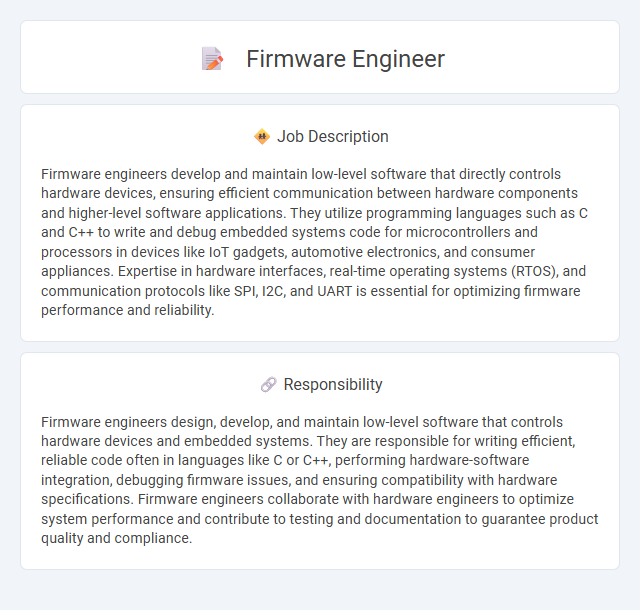
Firmware engineers develop and maintain low-level software that directly controls hardware devices, ensuring efficient communication between hardware components and higher-level software applications. They utilize programming languages such as C and C++ to write and debug embedded systems code for microcontrollers and processors in devices like IoT gadgets, automotive electronics, and consumer appliances. Expertise in hardware interfaces, real-time operating systems (RTOS), and communication protocols like SPI, I2C, and UART is essential for optimizing firmware performance and reliability.
Individuals with strong problem-solving skills and a passion for low-level programming are likely well-suited for a firmware engineer role. Those who enjoy working closely with hardware and possess patience for meticulous debugging might find this job fulfilling. Conversely, people who prefer high-level, abstract tasks or dislike complex technical challenges may struggle in this position.
Qualification
A Firmware Engineer typically requires a bachelor's degree in Computer Engineering, Electrical Engineering, or a related field with strong proficiency in C and C++ programming languages. Expertise in embedded systems, microcontroller architecture, and real-time operating systems (RTOS) is essential for designing and optimizing firmware solutions. Practical experience with debugging tools, hardware interfaces like SPI, I2C, UART, and a solid understanding of software-hardware integration greatly enhance job performance.
Responsibility
Firmware engineers design, develop, and maintain low-level software that controls hardware devices and embedded systems. They are responsible for writing efficient, reliable code often in languages like C or C++, performing hardware-software integration, debugging firmware issues, and ensuring compatibility with hardware specifications. Firmware engineers collaborate with hardware engineers to optimize system performance and contribute to testing and documentation to guarantee product quality and compliance.
Benefit
Firmware engineers likely benefit from high demand in industries such as automotive, consumer electronics, and IoT, leading to competitive salaries and job stability. Opportunities for skill development in embedded systems and low-level programming may enhance career growth and marketability. Access to cutting-edge technology projects could provide continuous learning and innovation experiences.
Challenge
Firmware engineer roles often involve complex problem-solving tasks that challenge one's ability to optimize hardware-software integration. Navigating intricate coding environments and troubleshooting low-level issues likely requires continuous learning and adaptability. The probability of encountering cutting-edge technologies and contributing to innovative product development makes this position intellectually stimulating.
Career Advancement
Firmware engineers can accelerate their career progression by mastering embedded systems, real-time operating systems, and low-level programming languages such as C and Assembly. Gaining expertise in hardware-software integration, debugging tools, and IoT protocols increases their value in industries like automotive, aerospace, and consumer electronics. Pursuing certifications and advanced degrees in embedded systems or computer engineering further enhances opportunities for leadership roles and specialized positions.
 kuljobs.com
kuljobs.com